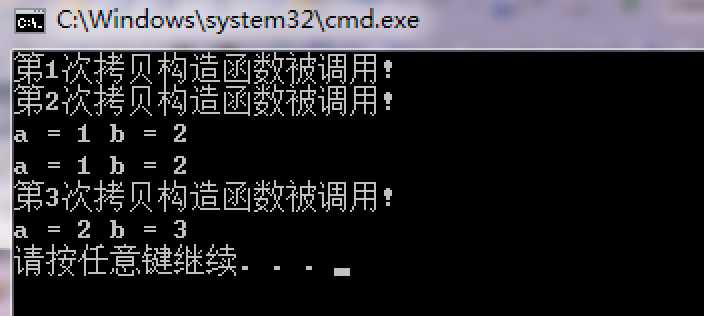校招面试 之 C++第4题 拷贝构造函数被调用的3个时机
Posted xuelisheng
tags:
篇首语:本文由小常识网(cha138.com)小编为大家整理,主要介绍了校招面试 之 C++第4题 拷贝构造函数被调用的3个时机相关的知识,希望对你有一定的参考价值。
1、被调用的3个时机:
(1)直接初始化或拷贝初始化;
(2)将一个对象作为一个实参传递,形参采用非指针或非引用的对象进行接收时;
(3)函数的返回值是一个非指针或者非对象被接收时。
2、举例说明:
#include <iostream> using namespace std; class Test{ private: int a; int b; static int count; public: Test(int i, int j): a(i), b(j){} void print(); Test(Test &t); void fun(Test t); Test fun1(); }; int Test::count = 1; void Test::print(){ cout<<"a = "<<a<<" b = "<<b<<endl; } Test::Test(Test & t){ cout<<"第"<<count++<<"次拷贝构造函数被调用! "<<endl; this->a = t.a; this->b = t.b; } void Test::fun(Test t){ // 关于情形2 需要注意的是:形参不能是引用或者不能是指针的对象 cout<<"a = "<<t.a<<" b = "<<t.b<<endl; } Test Test::fun1(){ // 关于情形3 需要注意的是:返回类型不能是引用或者不能是指针的对象 this->a = this ->a ++; this->b = this->b ++; return *this; } int main(int argc, char*argv[]) { Test t(1,2); // 调用拷贝构造函数 情形1 Test t1(t); // 调用拷贝构造函数 情形2 t1.fun(t); t.print(); // 调用拷贝构造函数 情形3 Test t3 = t1.fun1(); // 注意这种情况不会调用重载赋值操作符 Test t; t = t1这种情况的赋值运算符是会被重载的 t3.print(); system("pause"); return 0; }
输出结果:

以上是关于校招面试 之 C++第4题 拷贝构造函数被调用的3个时机的主要内容,如果未能解决你的问题,请参考以下文章